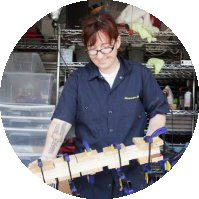Distinguished Visitor Presentation: Algorithmic Music Composition

The IEEE Computer Society North Saskatchewan Chapter is pleased to welcome Distinguished Visitor Michelle Thompson.
Michelle is giving a presentation on Algorithmic Music Composition.
Time: June 17 at 3:30pm
Place: The Engineering Building at the University of Saskatchewan, Room 2C40
Parking: Visitor Parking is available at meters and lots near the Engineering Building. Parking is administered by the University of Saskatchewan. See this page for more details.
If you are interestred, please register as soon as possible!
See additional details below.
Date and Time
Location
Hosts
Registration
-
 Add Event to Calendar
Add Event to Calendar
- 57 Campus Drive
- Saskatoon, Saskatchewan
- Canada S7N 5A9
- Building: Engineering Building
- Room Number: 2C40
- Click here for Map
Speakers
 Michelle Thompson
Michelle Thompson
Algorithmic Music Composition
Algorithmic composition of music is a sweeping intersection between mathematics, information theory, aesthetics, and artistry. Attempts to artificially create composed music that passes human muster has a long history. Current efforts in algorithmic composition include machine learning, deep learning, Markov chains, and biomimicry. Artificially intelligent music composition is not yet fully realized, but algorithms that assist human composers exist and are here to stay. The choices we make in how to represent and model music is of critical importance.
Artificial intelligence is only as good as the input data.
- What is it about music that makes it particularly challenging as a target of machine learning? Can music be treated simply as a time series?
- What are the many areas of music practice that machine learning can address?
- What might a computerized intelligent agent do for a busy composer?
- Can and should machine learning archive the sound of particular artists, so that their mastery can be modeled and synthesized on demand for all time?
- Are there hidden structures in sound that provide a mathematical theory of aesthetics?
- What are the ethics and repercussions of replacing composers?
Biography:
Michelle Thompson has an MSEE in Information Theory, has experience with machine learning and embedded programming, and is a practicing amateur musician.
Address:California, United States
Agenda
| 3:30pm | Sign-in |
|---|---|
| 3:40pm | Presentation and Questions |

